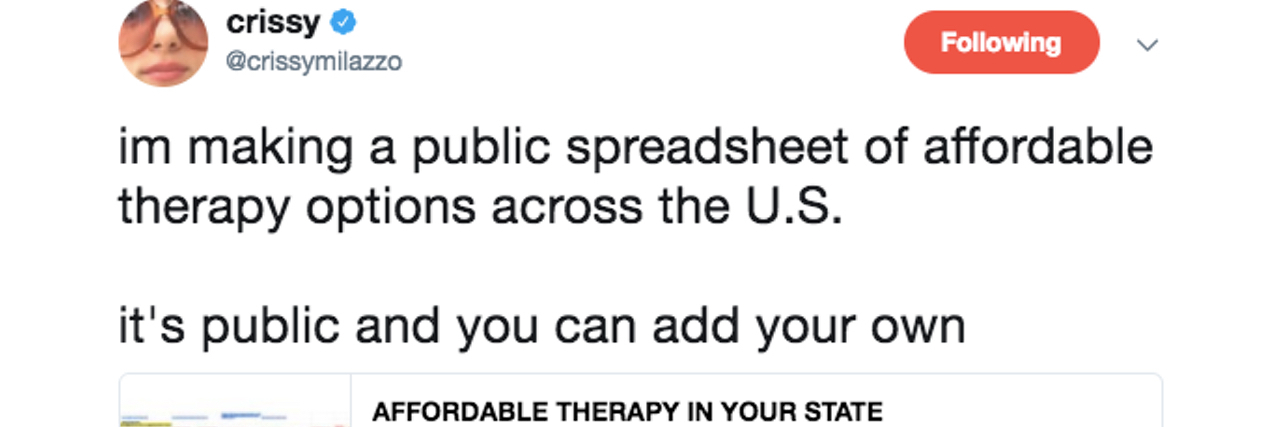After three of her friends died by suicide over the course of a year, Crissy Milazzo knew she had to do something to help people access mental health care.
A writer with more than 10,000 followers on Twitter, Milazzo decided to crowdsource a list of affordable therapy options across the U.S. — a list she’s since shared for anyone who needs it or has an affordable mental health option they’d like to add.
im making a public spreadsheet of affordable therapy options across the U.S.
it’s public and you can add your own https://t.co/o7twg4TwqR
— crissy (@crissymilazzo) August 2, 2017
The idea to crowdsource therapy options came after one of her friends died by suicide. “We raised all this money online and that’s kind of when I saw the impact of crowdsourcing,” Milazzo told The Mighty. “I think his funeral fund raised $11,000 in two days. If only he could have seen something like this when he was alive.”
Beyond her grief as a suicide loss survivor, Milazzo knows firsthand how important therapy can be in mental health recovery. “I found affordable therapy recently and am taking meds, but it took me a really long time,” she said, adding:
Because of all the experience I had with grief and getting help for myself and just seeing the power of crowdsourcing, I think that all came together for me to want to do something in the vein of that. And also just how hard it was for me to find affordable therapy combined with how useless and powerless you can feel when you lose someone made me go headfirst into trying to do something, anything.
For young people and those limited by their finances, the cost of therapy is often what stops people from getting care. According to therapist listing site Goodtherapy.org, most therapists charge between $75 to $150 per session. Since most therapists recommend you see them once a week, therapy can get expensive fast, ranging from $300 to $600 per month without insurance.
“I think that [not being able to afford therapy] was a thing for a lot of my friends who ultimately ended up passing away,” Milazzo said. “The therapy they could get was either through their parents and felt parentally controlled or was very expensive or really far away.”
While suicide hotlines and crisis lines exist, these aren’t alternatives to long-term mental health care, Milazzo said. “I just want to make it more normalized for people who experience mental illness to talk about it because I feel like it’s more [common] at this point for people who don’t have firsthand experience to say ‘call this number’ or list the suicide hotline.”
Instead, Milazzo said, if you know someone who is struggling with a mental illness, take the time to talk to them. “I just wish people would listen and ask what it’s like and what I’m going through instead of feeling like they need to ring the alarm,” she said. “Instead of discouraging people from talking about mental illness, I just wanted to make it more open and make people feel more comfortable.”
Currently, Milazzo’s list has resources for finding therapists across the U.S. as well as remote therapy options. The list also features specific clinics for a number of states, which Milazzo hopes to further expand through crowdsourcing.
“For me personally, I lost my health insurance at the beginning of the year when I turned 26 and my therapist couldn’t see me anymore. Even with insurance, it can be hard,” she said. “I think there are affordable options out there and I hope to be able to help people find them. Plus, the more people use them, the more they exist.”
You can view Milazzo’s spreadsheet here.

